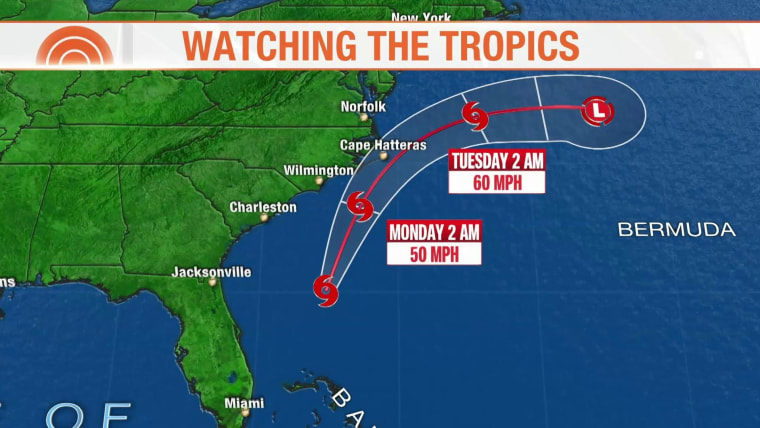This year’s hurricane season is expected to be busier than normal, with forecasters warning of the possibility that the coming months could be “extremely active” for tropical storms and hurricanes.
Scientists at the National Oceanic and Atmospheric Administration (NOAA) issued their outlook Thursday for the upcoming Atlantic hurricane season, which begins June 1 and stretches until Nov. 30. Experts warned that people should develop disaster preparedness plans early, particularly as the coronavirus pandemic will likely complicate emergency responses to extreme weather events.
“I want to emphasize now is the time to ensure that you have a plan in place,” acting NOAA Administrator Neil Jacobs said Thursday in a news briefing, adding that there is a chance that this season could be "extremely active."
This year, NOAA’s forecast predicts a 70 percent chance of 13 to 19 named storms with winds of 39 miles per hour or higher. Of those, six to 10 could become hurricanes, with winds of 74 miles per hour or higher, including three to six “major” hurricanes that reach Category 3 or higher, with winds of at least 111 miles per hour. An average season has 12 named storms, of which six become hurricanes, including three major hurricanes according to NOAA.
“The 2020 Atlantic hurricane season is expected to be a busy one,” said Gerry Bell, the lead hurricane season forecaster at NOAA's Climate Prediction Center.
Conditions in the Atlantic are already lively, and this is the sixth consecutive year that a named storm has formed before the official start of the Atlantic hurricane season. Tropical Storm Arthur formed over the weekend and made its closest approach to the Outer Banks of North Carolina on May 18 but ended up being short lived.
Preseason storms are becoming more common, but NOAA scientists have said that preseason activity does not necessarily portend what to expect in the coming months.
Let our news meet your inbox. The news and stories that matters, delivered weekday mornings.
Bell said several factors are influencing the agency’s above-average forecast, including warmer-than-average sea surface temperatures in the tropical Atlantic Ocean and the Caribbean Sea. Warm ocean temperatures are one of the key ingredients that fuel big tropical storms and hurricanes, and Bell said warmer-than-average conditions are expected to persist in these basins for the foreseeable future.
Researchers are also monitoring a recurring climate pattern known as the El Niño Southern Oscillation that is related to ocean temperatures and wind conditions in the equatorial Pacific Ocean.
El Niño develops when waters in the Pacific are warmer than usual, and these conditions typically increase wind shear in the Atlantic, which can disrupt major storms as they are forming. El Niño’s counterpart, La Niña, develops when the equatorial Pacific Ocean is cooler than average. This climate pattern weakens wind shear over the Atlantic, which can make conditions ripe for stronger and more frequent storms.
NOAA’s forecast shows neutral conditions at present, but there’s a 40 percent probability that La Niña could develop later this summer, which would be “strong enough to further increase Atlantic hurricane activity,” Bell said.
Long-duration changes in sea surface temperatures in the North Atlantic Ocean — fluctuations that are part of what’s known as the Atlantic Multidecadal Oscillation — have also been driving increased hurricane activity in this region for more than two decades. During warm phases of this climate pattern, storm activity typically increases, and during cool phases, activity typically wanes. Each phase can last anywhere from 20 to 40 years, according to NOAA.
“We’ve been in the warm phase of this decadal oscillation since 1995,” Bell said.
These large-scale patterns are also what makes it difficult for scientists to tease out what impact climate change may be having on Atlantic hurricane seasons.
In a study published Monday in the journal Proceedings of the National Academy of Sciences, NOAA scientists suggested that hurricanes around the world have become stronger over the past four decades because of global warming. The research looked at satellite images from 1979 onward and found that the likelihood of a hurricane developing into a Category 3 storm or higher increased by around 8 percent each decade.
But Bell said it’s harder to tease out the role climate change may be playing in Atlantic hurricane activity.
“The Atlantic is a little different from some of the other hurricane basins in that the historical record is dominated by this multidecadal variability and the El Niño/La Niña signal,” he said. “Those are really dominant signals and they are controlling the strength of the hurricane season.”
Still, Bell said, other dangers associated with climate change are clearly a factor, such as rising sea levels that can inundate coastal communities as hurricanes make landfall. Additionally, coastlines around the country have become more densely populated and developed over the decades, meaning more people could be in harm’s way.
And though people should be vigilant every hurricane season, emergency preparedness is particularly important this year because cities and states are still simultaneously grappling with the coronavirus pandemic.
“Social distancing and other CDC guidance to keep you safe from COVID-19 may impact the disaster preparedness plan you had in place, including what is in your go-kit, evacuation routes, shelters and more,” Carlos Castillo, acting deputy administrator for resilience at the Federal Emergency Management Agency, said in a statement, referring to the Centers for Disease Control and Prevention. “With tornado season at its peak, hurricane season around the corner, and flooding, earthquakes and wildfires a risk year-round, it is time to revise and adjust your emergency plan now.”
"plan" - Google News
May 22, 2020 at 02:21AM
https://ift.tt/2ZpwR7N
'Have a plan in place': Experts issue warnings ahead of projected busy hurricane season - NBCNews.com
"plan" - Google News
https://ift.tt/2un5VYV
Shoes Man Tutorial
Pos News Update
Meme Update
Korean Entertainment News
Japan News Update
Bagikan Berita Ini















0 Response to "'Have a plan in place': Experts issue warnings ahead of projected busy hurricane season - NBCNews.com"
Post a Comment